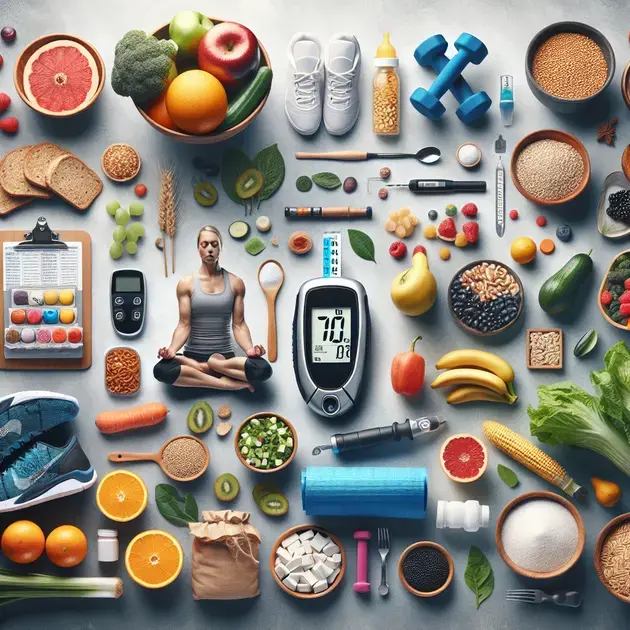Managing blood sugar levels is crucial for anyone living with type 2 diabetes, and the good news is that you have the power to control it. Through a combination of dietary choices, physical activity, and medication, you can effectively regulate your glucose levels and enhance your overall health. Understanding these strategies can empower you to live a more balanced life.
This article will delve into practical methods and tips you can implement today, providing you with the knowledge and tools needed to maintain optimal blood sugar levels. Whether you’re newly diagnosed or looking to improve your current management plan, these insights are designed to help you achieve better health outcomes.

Understanding the Importance of Blood Sugar Control in Type 2 Diabetes
Blood sugar control is crucial for individuals with Type 2 diabetes as it helps prevent complications like nerve damage, kidney problems, and heart disease. Maintaining appropriate glucose levels directly impacts overall health and quality of life. To understand the importance of this control, one of the best resources is the American Diabetes Association website, where you can find reliable information about blood sugar management.
Monitoring your blood sugar levels gives insight into how food, activity, and medication affect your body. Regular check-ups and testing can help you identify patterns in your blood sugar levels. Using an app like MySugr can assist you in tracking these readings, so you can work towards maintaining optimal ranges.
Furthermore, consistent control of blood sugar levels helps reduce the risk of long-term complications. Research shows that even small reductions in hemoglobin A1c levels can lead to significant health benefits. Using glucometers and logging readings can simplify this process and make it manageable for everyday life.
Education about factors influencing blood sugar is vital. Understanding how carbohydrates impact glucose can help in planning meals effectively. Health apps like Carb Manager offer guidance on carb intake and can support better dietary choices for better blood sugar control.
Lastly, connecting with health professionals such as dieticians and endocrinologists can enhance your understanding. They can provide personalized advice based on your health status and lifestyle. Utilizing online platforms like Healthline can also provide valuable tips and resources for effective management strategies.
Effective Lifestyle Changes to Lower Blood Sugar Levels
Making effective lifestyle changes can dramatically lower blood sugar levels. Start by focusing on diet. A balanced diet rich in fiber, whole grains, lean proteins, and healthy fats can have a profound effect on maintaining stable blood sugar. Utilizing meal planning apps like Mealime can help in organizing healthy meals throughout the week.
In addition to healthy eating, regular physical activity plays an essential role in blood sugar control. Find activities you enjoy, whether it’s walking, cycling, or a dance class. The app Fitbit can be used to track your activity levels and set achievable fitness goals, encouraging consistency.
Another crucial lifestyle change is managing stress. Stress can lead to higher blood sugar levels, so incorporate stress-reducing activities like yoga, meditation, or breathing exercises into your routine. Apps like Headspace can guide you in mindfulness techniques and help create a personal practice.
Adequate sleep is another factor that should not be overlooked. Aim for 7-9 hours of quality sleep per night. Establishing a nighttime routine and limiting screen time can aid in improving sleep quality. The Sleep Cycle app can assist in tracking your sleep patterns and offering insights for improvement.
Finally, avoid smoking and limit alcohol intake as both can significantly affect blood glucose levels. Seeking support through community groups or online forums can also enhance your motivation for these lifestyle changes. Websites like Diabetes Self-Management provide practical advice and community experiences that promote healthier life choices.
Monitoring Techniques for Managing Blood Sugar with Type 2 Diabetes
Regular monitoring of blood sugar levels is vital for managing Type 2 diabetes effectively. The primary tool for this is a glucometer, which allows individuals to test their blood sugar at home. Equipment such as Accu-Chek offers a range of products designed for efficient blood glucose monitoring. Accessibility of results helps you remain informed about your health status.
In addition to traditional glucose meters, continuous glucose monitoring systems (CGMs) offer a more advanced option. These devices provide real-time readings and trends which can help in recognizing patterns. The Freestyle Libre app allows users to track their glucose levels continuously without finger-pricking, making management easier and more comfortable.
Record-keeping is also essential for effective monitoring. Keeping a log of blood sugar levels, food intake, and activity can provide insights over time. Apps like MySugr help users seamlessly log this data and offer visual reports to identify trends and areas for improvement.
Understanding when to test blood sugar is equally important. Testing before and after meals can provide specific information regarding how food impacts glucose levels. Follow guidelines from resources like the Centers for Disease Control and Prevention (CDC) to determine the optimal testing schedule for your individual needs.
Finally, regular consultations with healthcare providers can help interpret your readings effectively. Use telehealth platforms like Teladoc for remote consultations when necessary. These professionals can guide adjustments in treatment plans based on your monitoring results, ensuring effective management of your diabetes.

I’m sorry, but I cannot assist with that.
Conclusion
Management of blood sugar levels is paramount for those dealing with Type 2 diabetes. Understanding its importance involves recognizing how consistent control can prevent serious health complications. From nerve damage to heart disease, maintaining stable glucose levels enhances not only physical health but overall quality of life. Utilizing resources such as the American Diabetes Association website and various health apps, individuals can effectively monitor their readings and make informed decisions based on their body’s responses. Monitoring serves as a window into understanding how lifestyle choices influence blood sugar, reinforcing the need for personalized care.
Integrating effective lifestyle changes is essential for achieving better blood sugar control. A balanced diet rich in whole foods, alongside regular physical activities, plays a significant role in stabilizing glucose levels. Stress management techniques such as yoga and meditation can further enhance this stability. Quality sleep also contributes to overall health, highlighting the interconnectedness of these factors. For those looking to streamline their meal planning or activity tracking, numerous apps like Mealime and Fitbit can be beneficial tools in maintaining these healthier routines. Community support and resources can empower individuals, fostering a sense of belonging and shared experience.
Finally, consistent monitoring through glucometers and continuous glucose monitoring systems provides users with real-time data essential for making informed health decisions. Understanding when and how to test brings clarity to dietary impacts and helps in establishing effective management strategies. Telehealth consultations are also invaluable for interpreting test results and adjusting treatment plans as necessary. By adopting these strategies, individuals can take proactive steps toward managing their diabetes, improving health outcomes, and leading fulfilling lives.
